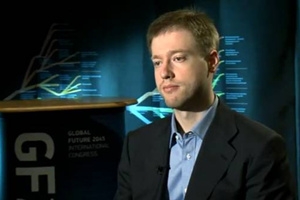(单词翻译:单击)

Startups devise some fairly clever tactics to sell investors on their business models, but Russian tech entrepreneur Dmitry Itskov's newest venture sells itself: Invest in his new research and development interest and the payoff could be immortality. A new corporate entity that the Russian multi-millionaire will formally announce at an event in June will allow investors to bankroll research into neuroscience and human consciousness with the ultimate goal of transferring human minds into robots, extending human life indefinitely. Early investors will be first in line for the technology when it matures, something Itskov believes will happen in the 2040s.
创业公司想出各种非常聪明的办法来向投资者推销自己的商业模式,但俄罗斯科技创业家德米特里?伊茨科夫的最新事业本身就是卖点:投资他的研发新项目,回报可能会是获得永生。这位俄罗斯大富豪将在今年6月的一次活动上正式宣布成立一家新的公司实体,为投资者提供机会,资助神经系统科学和人类意识的研究,最终把人的意识移植到机器人身上,从而无限期延长人类寿命。等到这项技术成熟(伊茨科夫认为这将在21世纪40年代实现)时,早期投资者可以优先使用。
Over lunch with reporters last week, 32-year-old Itskov outlined a rough roadmap for the future of his 2045 Initiative, a multi-decade research and development push to understand human consciousness and ultimately how to transfer it from human bodies into robotic avatars. When Itskov first became serious about selling off his Russian Internet concerns to pursue what he calls "the next evolutionary step for humanity" a few years ago, he had hoped to do so in a non-profit manner. But now, he says, he realizes that a business case is the best case for moving the project forward.
上周,在与记者共进午餐时,32岁的伊茨科夫粗略描绘了他“2045行动”的未来路线图。这个持续数十年的研发项目旨在弄清楚人类的意识,最终找到将人类意识从人体移植到机器人化身中的办法。几年前,伊茨科夫第一次开始认真地考虑出售他的俄罗斯互联网公司,以便追求他所说的“人类下一个进化步骤”。当时,他曾希望通过非盈利方式来完成。但现在他说,他意识到商业模式才是推动这个项目发展的最好方法。
"In the beginning I thought once we raised this question it would be obvious to people that this is possible and everyone would be interested," Itskov says. "It was naive thinking, I have to be honest. I understand now that I shouldn't neglect those business aspects that I tried to avoid when I started thinking about this idea. We have to create business opportunities in this process or nobody will be interested over the next ten or twenty years, especially the entrepreneurs that could potentially afford to do this."
“起初,我们提出这个项目时我曾认为,人们显然会相信这有可能实现,所有人都会感兴趣,”伊茨科夫说。“但我不得不承认,这个想法太天真了。现在我已经明白,我不应该忽略我在开始构思这个项目时试图回避的那些商业问题。我们必须在这个过程中创造商业机会,否则没人会对今后十年或二十年感兴趣,尤其是那些有钱投资这个项目的企业家。”
The 2045 Initiative is a complex and expensive research project, but its goals are fairly straightforward. First, by 2020 scientists will figure out how to control robots via brain-machine interfaces (read: mind control). By 2025 the goal is to place a human brain into a working robot and have that person's consciousness (memories, personality, and everything else that makes up the "self") transfer along with it. After that things tip very seriously over into the realm of science fiction, as the later stages of the project aim to create robots with artificial brains to which human consciousness can be uploaded (by 2035) and, finally, completely disembodied consciousness that is something like a hologram version of a person's mind.
“2045行动”是一向异常复杂、耗资巨大的研究项目,但它的目标相当明确。首先,到2020年,科学家们将解决如何通过脑机接口(也就是意识控制)来控制机器人的问题。到2025年,目标是把人脑移植到机器人身上,让那个人的意识(记忆,性格以及构成“自我”的其他所有东西)也一同转移。此后则进入了科幻领域。这个项目后期阶段的目标是创造具有人工大脑的机器人,接着把人的意识上传到人工大脑(到2035年),最后使意识彻底脱离肉体,就好比是个人意识的全息图。
If this all sounds a little crazy, Itskov says, that's because it is. But it's certainly not impossible. He likens the initiative to the U.S. space program, whose ultimate achievements seemed impossible in 1939, three decades prior to the moon landing. And, as with the space program, Itskov sees the 2045 Initiative as an engine for technological and economic development, one that will drive discovery in neuroscience, robotics, artificial intelligence—even spirituality. When Itskov begins leafing through slides on his laptop highlighting very real, very sophisticated brain-machine interface technologies that already exist in research labs today, the first phase of his project suddenly feels more realistic. The later phases of the 2045 Initiative still seem to border on the impossible, but Itskov is completely confident that technology will evolve to conquer these seemingly insurmountable challenges.
伊茨科夫说,如果这听起来有点疯狂,那是因为本就如此,但并非不可能实现。他把这个项目比作美国太空计划。1939年,也就是登月前30年,美国太空计划的最终目标也似乎不可能实现。和太空计划一样,伊茨科夫把“2045行动”视为技术和经济发展的引擎,将推动神经系统科学、机器人技术、人工智能甚至灵学的进步。当伊茨科夫开始在笔记本电脑上翻阅幻灯片,展示如今实验室里已有的那些非常真实、非常先进的脑机接口技术时,这个项目的第一阶段突然之间显得更加可行了。“2045 行动”的后期阶段似乎仍然不太可能实现,但伊茨科夫完全相信,技术的进步将征服这些看似不可逾越的挑战。


